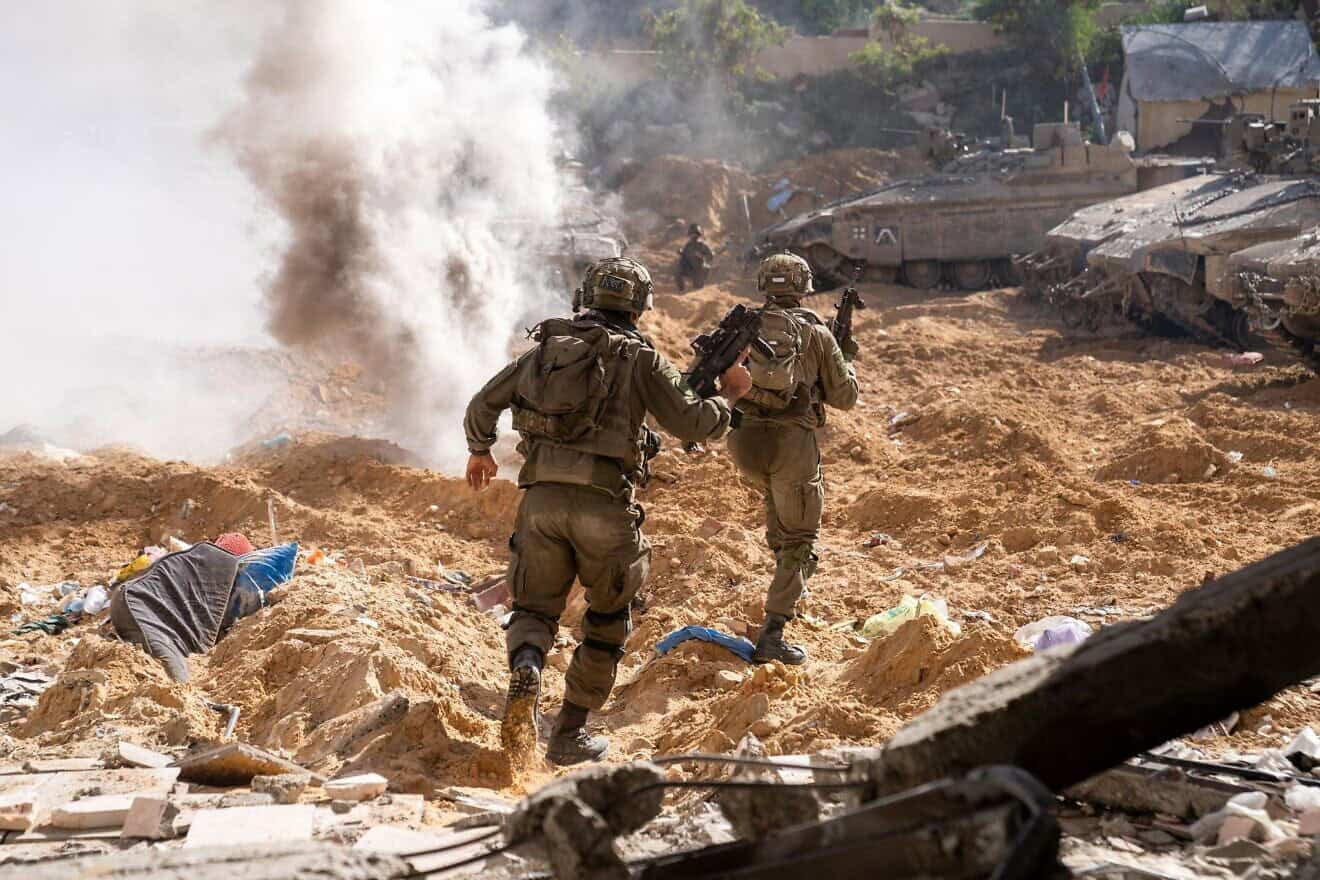 Israeli Security Cabinet approves expanding war against Hamas in Gaza
Israeli Security Cabinet approves expanding war against Hamas in Gaza
JNS Staff
“We are increasing the pressure with the goal of bringing our [captive] people back and defeating Hamas,” said IDF Chief of Staff Lt. Gen. Eyal Zamir.
 Israeli troops participate in a counter-terror operation in the area of the Indonesian Hospital in Beit Lahia, northern Gaza, December 2024. Credit: IDF.
Israeli troops participate in a counter-terror operation in the area of the Indonesian Hospital in Beit Lahia, northern Gaza, December 2024. Credit: IDF.
Israel’s Security Cabinet voted unanimously on Sunday night to expand the IDF offensive against the Hamas terrorist organization in the Gaza Strip.
The approved plans include “occupying Gaza and holding on to the territory,” as well as “powerful strikes” on Hamas, a source in the Prime Minister’s Office told reporters.
The ministers also approved plans to possibly resume aid to the coastal enclave through an international fund that would seek to prevent the supplies from being looted by Hamas. Israeli National Security Minister Itamar Ben-Gvir was the sole minister to oppose the move.
The distribution of aid is expected to be carried out by the American security companies that inspected vehicles returning to Gaza’s north during the January-March ceasefire.
An Israeli official quoted by the Walla outlet said that the expanded ground operation will likely only be carried out after U.S. President Donald Trump’s expected visit to the Middle East ends next week.
Earlier on Sunday, IDF Chief of Staff Lt. Gen. Eyal Zamir said that the military was calling up tens of thousands of additional reservists.
“This week, we are issuing tens of thousands of call-up orders to our reservists in order to intensify and expand our operation in Gaza,” Zamir told members of the Flotilla 13 naval commando unit. “We are increasing the pressure with the goal of bringing our people back and defeating Hamas. We will operate in additional areas and destroy all infrastructure above and below ground.”
Defense sources noted that the mobilization is one of the largest since the war began 19 months ago, with newly called-up reservists being integrated into training and operational deployments.
Zamir spoke as the Security Cabinet convened in Jerusalem to discuss the next phase of the military campaign.
“I am assembling the Cabinet today to discuss the next stage of the IDF chief of staff’s proposal,” said Prime Minister Benjamin Netanyahu. “I cannot detail it here, but we are focusing on two things: returning our hostages and defeating Hamas. Military pressure works—and this is what will work now as well,” he added, noting that 147 hostages have been rescued alive so far.
In a separate statement, the IDF confirmed that Israeli forces continue to operate across the Gaza Strip to dismantle terrorist infrastructure and protect Israeli civilians. The 205th “Iron Fist” Reserve Armored Brigade is active in Rafah, in Gaza’s southernmost region, where it has destroyed Hamas positions above and below ground and killed dozens of terrorists.
The IDF also reported the discovery of a weapons depot located 260 feet from a former school and approximately 330 feet from a former hospital in Rafah.
Over the weekend, IDF troops, operating in coordination with the Israel Security Agency (Shin Bet), carried out extensive operations across the Gaza Strip. In Gaza City, reservists from the Jerusalem Brigade, operating under the 252nd “Sinai” Division, continued to engage Hamas operatives in the Shejaiya neighborhood, dismantling underground infrastructure and seizing weapons caches.
The Israeli Air Force attacked more than 100 terrorist targets throughout Gaza, including tunnel shafts, command centers and structures used by armed cells, the military said. Ground forces located and destroyed additional weapons and killed several terrorists.
In one such strike, the IDF destroyed armed and launch-ready Hamas rocket platforms in the Khan Yunis area that were aimed at Israeli territory. Explosions observed after the strike indicated the presence of multiple rockets prepared for launch. The military said it would continue acting forcefully and decisively against all terrorist groups in Gaza.
Despite ongoing strikes, the IDF assesses that Hamas maintains at least two organized brigades and continues to pose a threat. However, Israeli officials have noted that recent military and humanitarian pressure is hurting the group’s ability to operate. Some Hamas fighters have surrendered, and the terrorist organization’s command and control systems have sustained significant damage.
Israeli Strategic Affairs Minister Ron Dermer, who has led negotiations for a hostage deal, reiterated at the JNS International Policy Summit last week that Israel remains committed both to defeating Hamas and securing the release of all hostages.
“There are people in Israel who say, forget about the hostages—just finish the war. Others say, forget about the war—just bring them home. We’re not going to do that,” said Dermer. “That’s not where Prime Minister Netanyahu is. It’s not where I am.”
He predicted that 12 months from now, the multi-front conflict facing Israel across the Middle East will be over—and that “Israel will have won.”
Israel’s stated objectives in the war remain the dismantling of Hamas as a political and military force, the return of all hostages, and the prevention of Gaza from posing a future security threat.
Zawartość publikowanych artykułów i materiałów nie reprezentuje poglądów ani opinii Reunion’68,
ani też webmastera Blogu Reunion’68, chyba ze jest to wyraźnie zaznaczone.
Twoje uwagi, linki, własne artykuły lub wiadomości prześlij na adres:
webmaster@reunion68.com
